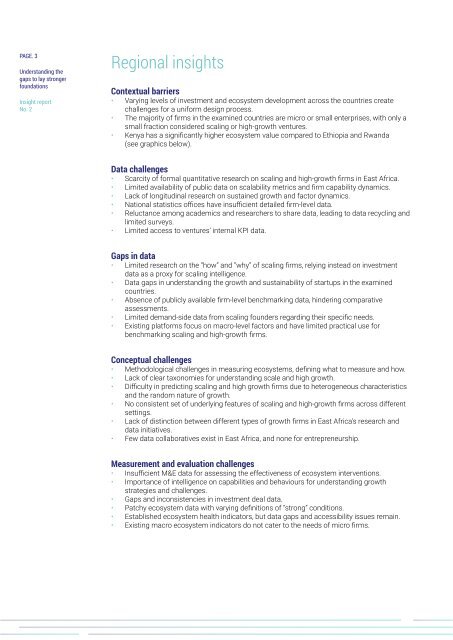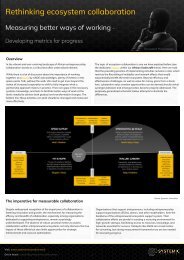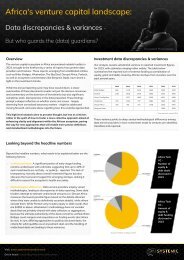Understanding the gaps to lay stronger foundations.
Appraising scaling data indicators in Kenya, Ethiopia and Rwanda. In this report, we highlight key elements of a data supply audit undertaken to determine what data exists that is relevant to scaling ventures in Kenya, Ethiopia and Rwanda. The findings inform the co-design and co-development of country-level data collaboratives to support ventures and ecosystem stakeholders by identifying, collating and diffusing relevant data and insights on scaling in the three countries.
Appraising scaling data indicators in Kenya, Ethiopia and Rwanda. In this report, we highlight key elements of a data supply audit undertaken to determine what data exists that is relevant to scaling ventures in Kenya, Ethiopia and Rwanda. The findings inform the co-design and co-development of country-level data collaboratives to support ventures and ecosystem stakeholders by identifying, collating and diffusing relevant data and insights on scaling in the three countries.
You also want an ePaper? Increase the reach of your titles
YUMPU automatically turns print PDFs into web optimized ePapers that Google loves.
PAGE. 3<br />
<strong>Understanding</strong> <strong>the</strong><br />
<strong>gaps</strong> <strong>to</strong> <strong>lay</strong> <strong>stronger</strong><br />
<strong>foundations</strong><br />
Insight report<br />
No. 2<br />
Regional insights<br />
Contextual barriers<br />
• Varying levels of investment and ecosystem development across <strong>the</strong> countries create<br />
challenges for a uniform design process.<br />
• The majority of firms in <strong>the</strong> examined countries are micro or small enterprises, with only a<br />
small fraction considered scaling or high-growth ventures.<br />
• Kenya has a significantly higher ecosystem value compared <strong>to</strong> Ethiopia and Rwanda<br />
(see graphics below).<br />
Data challenges<br />
• Scarcity of formal quantitative research on scaling and high-growth firms in East Africa.<br />
• Limited availability of public data on scalability metrics and firm capability dynamics.<br />
• Lack of longitudinal research on sustained growth and fac<strong>to</strong>r dynamics.<br />
• National statistics offices have insufficient detailed firm-level data.<br />
• Reluctance among academics and researchers <strong>to</strong> share data, leading <strong>to</strong> data recycling and<br />
limited surveys.<br />
• Limited access <strong>to</strong> ventures’ internal KPI data.<br />
Gaps in data<br />
• Limited research on <strong>the</strong> “how” and “why” of scaling firms, relying instead on investment<br />
data as a proxy for scaling intelligence.<br />
• Data <strong>gaps</strong> in understanding <strong>the</strong> growth and sustainability of startups in <strong>the</strong> examined<br />
countries.<br />
• Absence of publicly available firm-level benchmarking data, hindering comparative<br />
assessments.<br />
• Limited demand-side data from scaling founders regarding <strong>the</strong>ir specific needs.<br />
• Existing platforms focus on macro-level fac<strong>to</strong>rs and have limited practical use for<br />
benchmarking scaling and high-growth firms.<br />
Conceptual challenges<br />
• Methodological challenges in measuring ecosystems, defining what <strong>to</strong> measure and how.<br />
• Lack of clear taxonomies for understanding scale and high growth.<br />
• Difficulty in predicting scaling and high growth firms due <strong>to</strong> heterogeneous characteristics<br />
and <strong>the</strong> random nature of growth.<br />
• No consistent set of underlying features of scaling and high-growth firms across different<br />
settings.<br />
• Lack of distinction between different types of growth firms in East Africa’s research and<br />
data initiatives.<br />
• Few data collaboratives exist in East Africa, and none for entrepreneurship.<br />
Measurement and evaluation challenges<br />
• Insufficient M&E data for assessing <strong>the</strong> effectiveness of ecosystem interventions.<br />
• Importance of intelligence on capabilities and behaviours for understanding growth<br />
strategies and challenges.<br />
• Gaps and inconsistencies in investment deal data.<br />
• Patchy ecosystem data with varying definitions of “strong” conditions.<br />
• Established ecosystem health indica<strong>to</strong>rs, but data <strong>gaps</strong> and accessibility issues remain.<br />
• Existing macro ecosystem indica<strong>to</strong>rs do not cater <strong>to</strong> <strong>the</strong> needs of micro firms.








